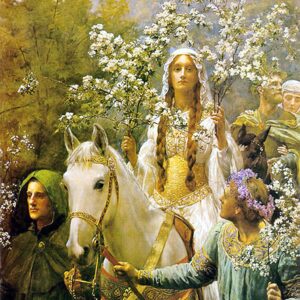Nasty Women: Prague, June 16-17, 2018
These days I am delving deep into Mythic Nasty Women as I prepare for my workshop in Prague on June 15, 2018. http://seminare.maitrea.cz/temne-bohyne-mary-diggin
A friend last week suggested I should call my workshop and book “Wonderful Nasty Women,” or maybe “Wonderfully Nasty Women.” She felt that Nasty Women might seem off-putting. She may be correct in that of course what I am aiming for is a redemption of some of the powerful feminine mythic beings who have been denigrated and often defeated by a male hero. In many ways, my work could almost equally be titled “Taking down the Nasty Hero.”
I began this particular project because of Donald Trump’s comment to Hilary Clinton during the final USA 2016 Presidential debate. Mr. Trump is known for his aggrandizing and often aggressive commentary, even now, as the elected President of the USA. Back in November 2016, he was a candidate for the presidency and in the third and final debate, he interrupted his opponent, Hillary Clinton and muttered “such a nasty woman,” into his microphone. It was meant as a putdown. He could not have foreseen how “nasty woman” would become a badge of honor for many women, uniting them in the face of perceived misogyny.
In myth, the hero is often opposed to a goddess. Mythic encounters like that of Tiamat and Marduk, or Medusa and Perseus result in the defeat and death of the goddess. Indeed, during the run up to the USA elections, many pro-Trump supporters drew on the myth of Perseus and Medusa. The image of Cellini’s famous statue of Perseus holding aloft the head of Medusa was edited to portray Trump as Perseus holding up the head of Clinton as Medusa and made available to be printed on T-shirts and other paraphernalia. https://www.redbubble.com/people/eyemagined/works/22918216-perseus-beheads-medusa
Since this mythic imagery was so alive in the culture, I began looking at the myths where powerful feminine beings, both goddesses and women, find themselves standing against a male, god or man. Usually the Masculine figure is portrayed as the hero, often as a warrior hero, whose defeat of the goddess/woman is seen as a positive action. Figures such as Marduk, who defeats and kills his grandmother, Tiamat is one, as is Perseus who kills Medusa.
However, in Irish myth, The Morrigan, often characterized as a war goddess, opposes CuChulainn, the Irish warrior hero as does Queen Maebh, who leads armies against him. In this myth, the hero eventually dies. The story is not one of simple reversal of the “hero defeating the goddess’” motif but is one that illuminates the complex relationships between the hero energy and the feminine energies. Love, seduction, shape-changing, anger, wiliness are all part of the feminine approach as the women and goddess try and move Cuchulainn into a different way of reacting. But he is deaf to their entreaties and numb to their approaches and actively rejects each and everyone of the powerful women who come to him. I explored this in an article in Immanence Journal, published in April 2017. http://immanencejournal.com
It seems to me that when a person or a culture is caught in the warrior hero energy, they are unable to hear the other voices that suggest alternative approaches. Caught as they are in a battlefield stance, sure of their own importance and infallibility, they reject and belittle other approaches.
It is a battlefield stance. I think it is important to be aware of this. It is not a stance towards home and community. We forget to come home from war and we forget to bring our warriors home and take war out of them. Look at the instances of PSTD in veterans and non-veterans alike. Much of what we do in society these days seems to come from living as if we are in a battlefield. We no longer have rituals that may aid us in the movement towards creativity and aliveness. Indeed, we are not even aware that the movement needs to occur.
The belittling of others is a key indication of being caught in this mythic perspective. Stylized verbal hostility is a common element in mythic encounters, involving boasting, self-aggrandizement and belittling of opponents. Walter Ong noted in his seminal book Orality and Literacy that “[b]ragging about one’s own prowess and/or verbal tongue-lashings of an opponent figure regularly in encounters between characters in narrative: in the Iliad, in Beowulf, throughout medieval European romance, in The Mwindo Epic and countless other African stories…, in the Bible, as between David and Goliath (Ong 43).
We see this aspect of verbal taunting coming more and more to the fore, certainly in USA politics but also worldwide. The Warrior hero stance is one that seems easy to fall into and has repercussions in both our public and domestic lives. Unfortunately, many women experience this energy in their own homes, in their own lives where belittling and demeaning can be as much a part of the personal and domestic culture as it is the larger political and social scenes.
So in the face of this, what can women do? Can they continue to work for change knowing that the heroic will belittle and reject? That they may not be heard? That aiming directly at the apparent heroes may not always be the most fruitful approach? Can they find the way forward for themselves personally, in their own lives as well as in the more public spheres?
In Prague, I will explore some of these mythic perspectives both through story telling and through deep imagery journeys into the myths. The women who join me will have the opportunity to find themselves in these myths, to discover the way forward for themselves, in their own lives.
The joy of working with imagery and these stories is that the results will most likely be surprising even for me. What I have written is what I think about these mythic events. I know the women I will work with will engage their own deep wisdom about these myths and the results will be amazing!





